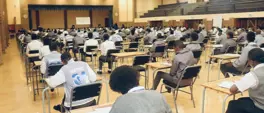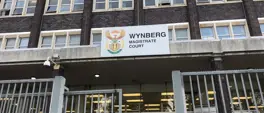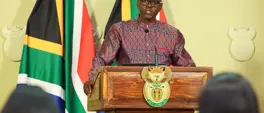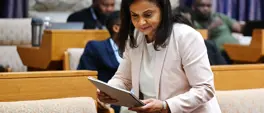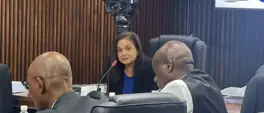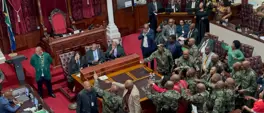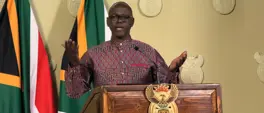DEEPNA DESAI | Ramaphosa’s National dialogue is out of touch
Deepna Desai
5 July 2025 | 10:15While our communities continue to grapple with gender-based violence, crime, corruption, inequality, and deepening social divisions, what we are being offered is not meaningful engagement to confront these urgent crises, but rather a carefully staged event that remains completely disconnected from the daily realities and struggles of ordinary citizens.
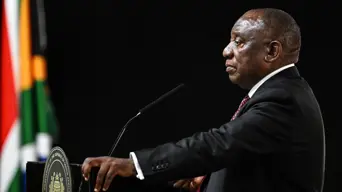
President Cyril Ramaphosa. Picture: Phando Jikelo/Parliament
President Cyril Ramaphosa's announcement of a National Dialogue, intended to forge consensus around a new 30-year National Development Plan, is yet another reminder of how disconnected our leadership has become from the realities South Africans face daily.
While our communities continue to grapple with gender-based violence, crime, corruption, inequality, and deepening social divisions, what we are being offered is not meaningful engagement to confront these urgent crises, but rather a carefully staged event that remains completely disconnected from the daily realities and struggles of ordinary citizens.
The fatal flaw in this National Dialogue is that it skips the most critical first step: genuine grassroots engagement with the communities most affected by these crises. National consensus cannot be forged in luxury venues among elites while remaining disconnected from the experiences unfolding in township streets, rural villages, and community halls across South Africa.
Learning from the Past: Engagement Before Dialogue
The lesson isn’t new. The 2009 National Development Plan (NDP) process, led by then-Minister Trevor Manuel, was rooted in authentic engagement with thousands of South Africans. As Manuel made clear during the 2012 launch: “The Commission has listened to thousands of South Africans from all corners of the country, from all walks of life.” That process reflected a genuine commitment from ordinary people determined to help build a better South Africa. Manuel also understood that grand visions without substance are meaningless, cautioning: “Visions are visions. They are broad, frequently general. They are aspiration. But plans have to be detailed, supported by numbers.”
By contrast, Ramaphosa’s proposed National Dialogue feels like yet another broad, aspirational exercise-detached from the voices, data, and lived realities that must underpin meaningful, credible planning.
The President has Forgotten His Roots
Growing up in an African community, Ramaphosa would have been shaped by traditions that prioritised grassroots dialogue, justice under the tree, community gatherings, and collective problem-solving rooted in shared understanding and accountability.
In many African societies, the concept of justice under a tree is more than a symbol; it represents a system of accessible, transparent, community-driven justice. It is where disputes were aired openly, where leaders listened before they spoke, and where decisions reflected the lived experiences and consensus of the people.
Our Constitutional Court itself embodies these values, both in its jurisprudence and its physical design, which pays homage to this tradition. It reflects the idea that justice should not be distant, intimidating, or buried in bureaucracy, but visible, accessible, and grounded in the everyday language and lived realities of ordinary South Africans. Justice under a tree is about bringing leadership and accountability to the people - not forcing them to navigate complex, inaccessible systems.
Somewhere along the way, Ramaphosa seems to have lost sight of these foundational principles.
The Missing First Step: Engage Those on the Frontlines
We cannot have a meaningful national conversation without first engaging those on the frontlines: survivors, community leaders, police officers, social workers, and educators. Their exclusion renders this National Dialogue premature, uninformed, and fundamentally disconnected from the very crises it claims to address.
In my recent engagements with three police stations regarding gender-based violence, it became alarmingly clear how ill-prepared, unsupported, and excluded officers feel. Many expressed deep frustrations at the lack of tools, resources, and training to meaningfully respond to GBV cases. Some even asked, “How do we begin to deal with GBV?”
It was a stark reminder of a deeper failure: how can national policies claim to address South Africa’s crises when those tasked with delivering justice feel unheard, under-resourced, and completely disconnected from the broader conversation?
If Ramaphosa truly spent time listening to those on the frontlines — police officers, community workers, and survivors his policies would be shaped by lived realities, not by disconnected boardroom visions. Yet, he keeps missing this crucial first step.
Need we remind him? The Marikana tragedy of 2012 painfully exposed the consequences of sidelining grassroots engagement. As a former trade unionist and National Union of Mineworkers leader, Ramaphosa understands better than most the tensions that often simmer within the mining sector. He knew the power of dialogue, of sitting with workers, listening to grievances, and building solutions from the ground up.
But when workers at Lonmin's Marikana mine protested over wages and working conditions, that foundational approach was abandoned. Instead of fostering the kind of community engagement he once championed, the response was marked by detachment, miscommunication, and ultimately, tragedy.
When leaders disconnect from the communities they serve, when they prioritise elite, boardroom solutions over difficult, grassroots conversations, the consequences are not abstract. They are measured in lives lost, trust broken, and social cohesion destroyed.
The same mistake cannot be repeated. A National Dialogue that skips the first step - authentic, community-driven engagement is destined to fail before it even begins.
Ramaphosa’s Choice: Return to His Roots or Repeat the Same Mistakes
Before elite gatherings, media soundbites, and carefully staged dialogues, South Africa must return to its roots: listening to ordinary people, gathering credible data, and holding honest, often uncomfortable, community-driven conversations.
Consensus cannot be manufactured in boardrooms while the real South African story unfolds in communities that feel excluded, unheard, and abandoned. The solutions already exist, in the lived experiences and practical wisdom of those confronting these crises every day.
Ramaphosa must return to where he once witnessed real dialogue: under trees, around fires, in community halls, on picket lines. These were the spaces where authentic problem-solving shaped his own political journey as a trade unionist.
He would do well to take lessons from his comrades, like Trevor Manuel, whose NDP process showed that vision without measurable, practical action grounded in lived realities is meaningless. He should also reflect on the painful lessons of Marikana, where the failure to engage communities and listen contributed to tragedy.
Ramaphosa now faces a clear choice: continue with a premature, disconnected National Dialogue destined to fail, or embrace the hard, messy, yet transformative work of authentic, grassroots engagement.
Dialogue without that first step is not progress, it’s performance.
Until leadership returns to the people , to the communities, streets, and frontline spaces where real solutions begin , this National Dialogue will remain a political exercise, squandering time, resources, and the fragile trust of South Africans yearning for change.
Get the whole picture 💡
Take a look at the topic timeline for all related articles.
Trending News
More in Opinion

12 December 2025 15:34
CHARLES MATSEKE | The Republic of commissions arrives at its point of no return

12 December 2025 14:15
REBONE TAU | Ekurhuleni needs bold, decisive leaders to reverse years of capture

12 December 2025 05:13
MANDY WIENER | Searching for a superhero with a spine of steel: Why the position of NDPP matters so much



